When your refrigerator compressor only runs for 10 seconds, it can be frustrating and concerning. The compressor is what keeps your fridge cold and preserves your food. But why is it happening?
There are several reasons why your compressor has short cycling, from a faulty start relay to a blocked condenser coil.
In this article, we’ll explore the most common causes of a compressor that only runs for a short time.
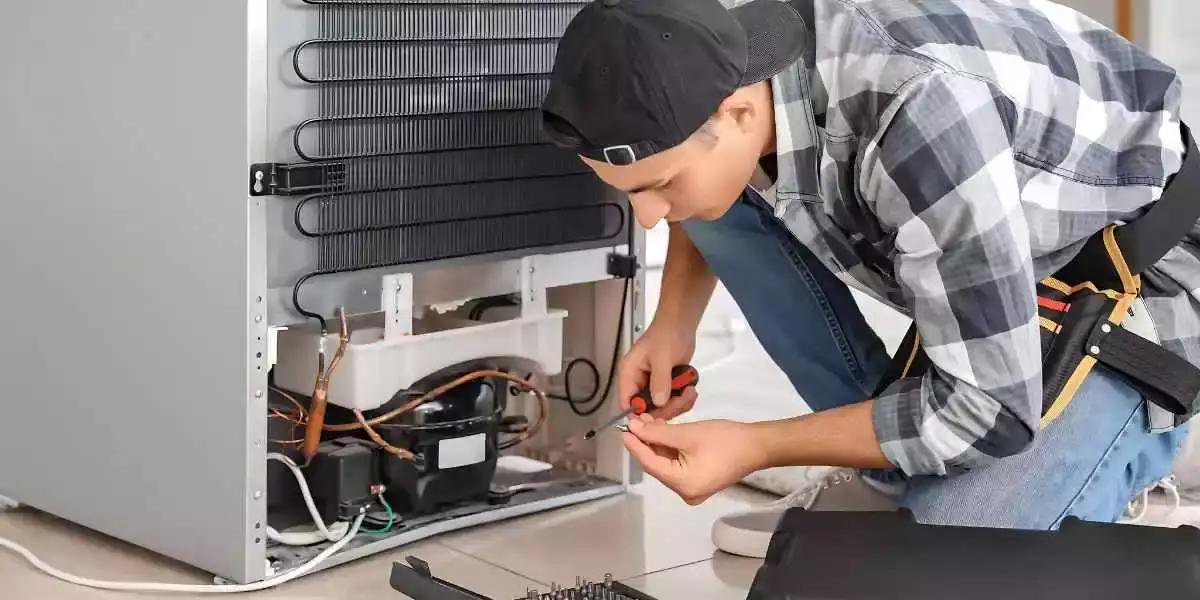
Why Your Refrigerator Compressor is Only Running for 10 Seconds
If your refrigerator is only running for a few seconds before turning off, it’s likely there are reasons behind it,
Power supply issues
If your refrigerator compressor only runs for 10 seconds, it could be for the power supply. Check if the power outlet is working properly.
Also, ensure that the circuit breaker or fuse is not tripped or blown. The problem can be caused by a faulty capacitor or relay, which are components that regulate the compressor’s start and run cycles.
Overheating compressor
Another reason why your refrigerator compressor can only run for a short time is overheating.
This can happen if the condenser coils, which are responsible for dissipating heat from the compressor, are dirty or blocked.
Clean the coils using a brush or vacuum cleaner. Ensure the refrigerator has enough clearance from the wall and other objects to allow for proper airflow.
Low refrigerant level
The problem can cause due to a low refrigerant level in the system. The low level of the refrigerator can not be able to cool the interior effectively which leads to short cycling.
You need to hire a professional to recharge the refrigerant.
Faulty thermostat
A faulty thermostat can also cause the compressor to run for only a brief time. The thermostat is the component to control the temperature inside the refrigerator and signals the compressor.
An undefective thermostat can not sense the correct temperature, causing the compressor to cycle too frequently. Check the thermostat’s settings and replacement.
Compressor failure
Finally, a compressor that runs for only a short time and then stops could be a sign of imminent failure, due to wear and tear, age, or a manufacturing defect.
If the compressor is faulty, replace it with a qualified technician. It is more cost-effective to replace the entire refrigerator instead of just the compressor.
How to diagnose a compressor issue
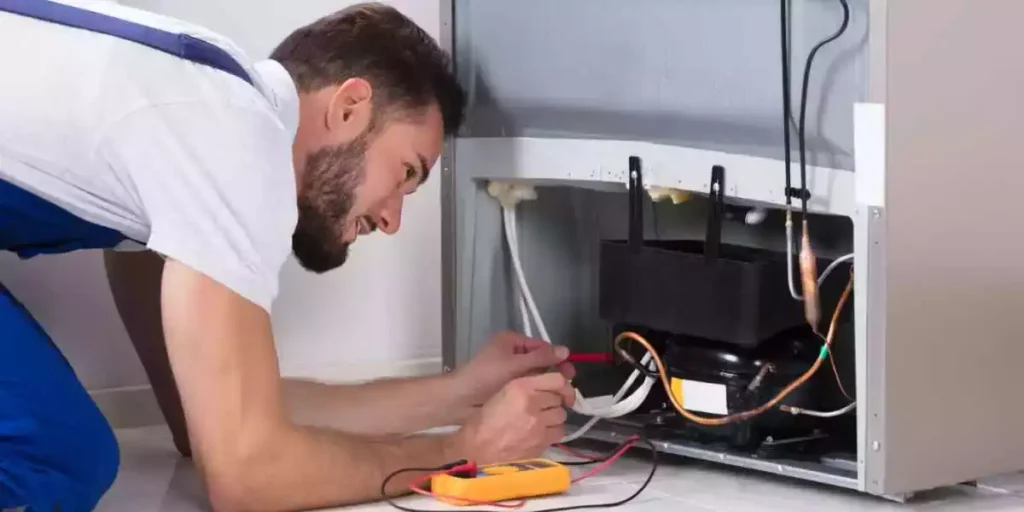
If you suspect the refrigerator compressor is not working correctly, here are some steps to help diagnose the issue:
Listen for unusual sounds
When the compressor turns on, it should make a humming or buzzing sound that lasts for several seconds.
Clicking or rattling noises can be a sign of a faulty start relay or capacitor. Squealing or hissing sounds can indicate a refrigerant leak or an issue with the compressor’s internal components.
Check the temperature
Not being enough cold of the inside temperature indicates sign of a compressor problem.
Use a thermometer to check the temperature and compare it to the recommended range.
Inspect the compressor
Locate the compressor at the back of the refrigerator and check if it’s vibrating or warm to the touch.
Overheating can be caused due to blocked condenser coils or insufficient airflow. If it’s not vibrating, it may not be receiving power or may be faulty.
Test the electrical components
The compressor relies on several electrical components, including the start relay, capacitor, and thermostat.
Use a multimeter to test the continuity and resistance of these components and ensure they’re working correctly.
Check the refrigerant level
Low refrigerant levels can cause the compressor to work harder than necessary, leading to premature wear and tear.
Hire a professional to check the refrigerant level and recharge the system if necessary.
The importance of the compressor in the refrigeration cycle
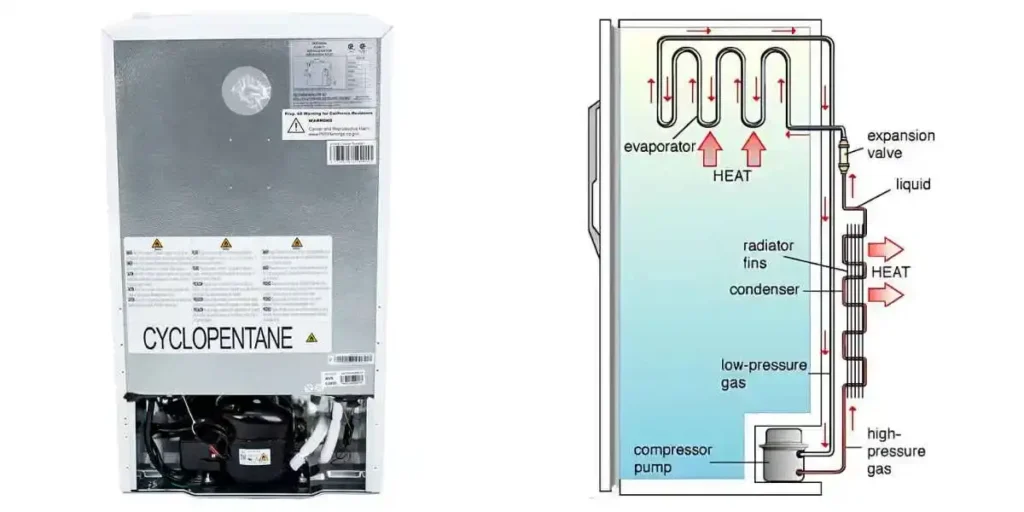
There are some importance of the compressor in each step of the refrigeration cycle.
Evaporation:
The compressor is responsible for compressing the refrigerant gas, raising its temperature and pressure, which allows it to absorb heat from the environment.
This process facilitates the transfer of heat from the evaporator to the refrigerant, which helps to cool the space.
Condensation:
In the condensation phase, the high–pressure refrigerant gas is converted back into a liquid state.
This transformation releases the heat absorbed during the evaporation phase into the environment.
The compressor’s role in this step is to increase the pressure and temperature of the refrigerant, enabling it to release heat effectively.
Expansion:
In the expansion phase, the refrigerant is throttled to reduce its pressure, causing it to expand and cool down.
The compressor plays a crucial role in this step by providing the necessary pressure to force the refrigerant through the expansion valve.
Compression:
The final step in the refrigeration cycle is the compression of the refrigerant gas.
The compressor takes low-pressure refrigerant gas from the evaporator and compresses it to a high-pressure state, enabling the cycle to start again.
Without the compressor, the refrigeration cycle would not be possible.
How to Fix a Refrigerator Compressor That Only Runs for 10 Seconds
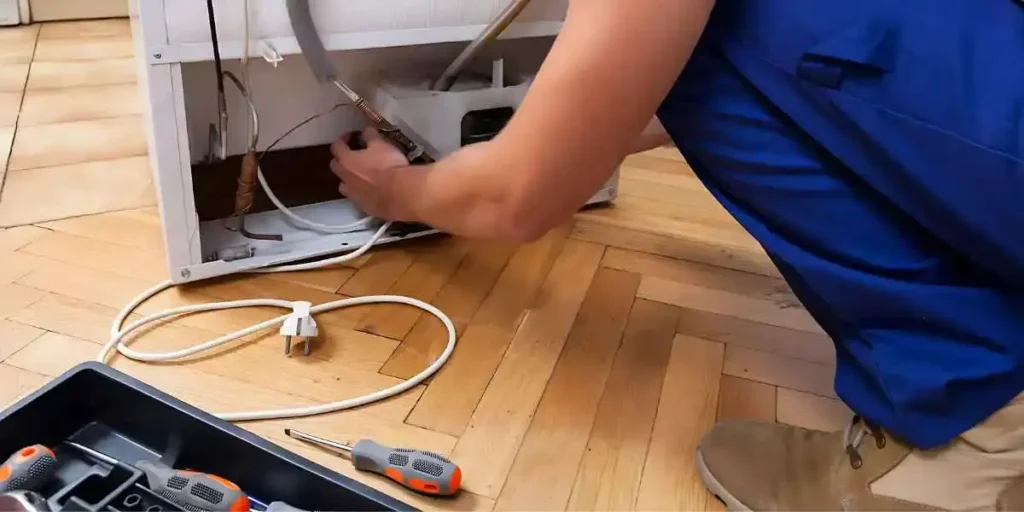
Here are some steps you can take to troubleshoot and potentially fix the issue:
Check the Power Supply:
Make sure that the refrigerator is receiving adequate power by checking the power outlet and the cord. The compressor will not receive enough power due to some issue.
Clean the Condenser Coils:
Dirty or clogged condenser coils can cause the compressor to overheat and shut off prematurely.
Clean the coils with a vacuum or a coil brush to improve the airflow and prevent overheating.
Check the Compressor Overload Protector:
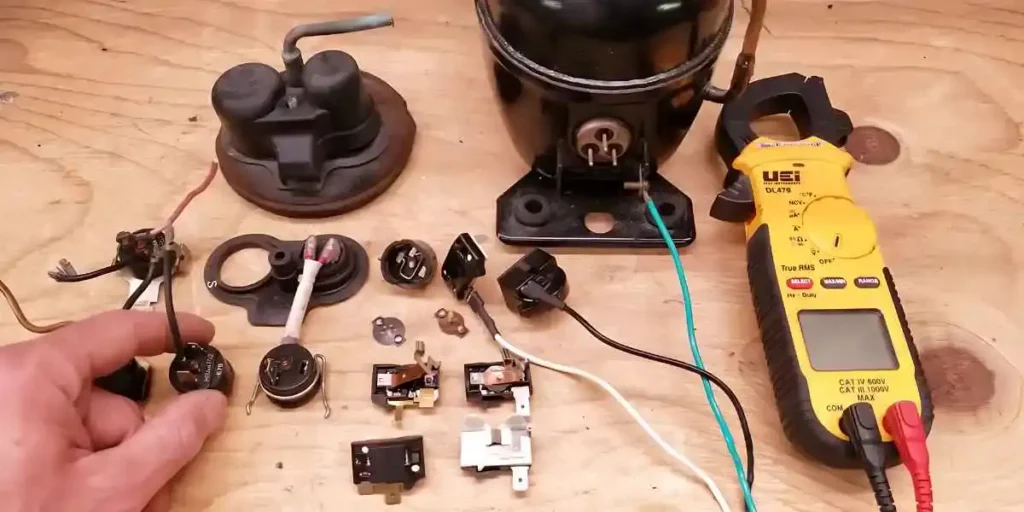
The compressor overload protector is a safety device that shuts off the compressor if it becomes too hot or draws too much current.
Check the overload protector to see if it has tripped and needs to be reset.
Test the Start Capacitor and Start Relay:
The start capacitor and start relay are responsible for providing the initial boost of power that the compressor needs to start running.
Test these components to see if they are functioning correctly.
Check the Compressor Motor:
If all other components are functioning correctly, it could be an issue with the compressor motor itself.
A professional refrigeration technician can test the motor and determine the needs.
Tips for maintaining your compressor’s health
Here are some tips for maintaining your compressor’s health:
Regularly Clean and Inspect the Compressor:
Inspect your compressor regularly for any signs of wear and tear, oil leaks, or damage.
Clean the compressor and its surrounding area regularly to prevent dirt, dust, and debris from clogging the system.
Check the Refrigerant Charge:
A low or high refrigerant charge can put undue stress on the compressor, leading to damage and eventual failure.
Regularly check the refrigerant charge within the manufacturer’s recommended range.
Ensure Proper Lubrication:
The compressor requires proper lubrication to function correctly. Check the oil levels regularly and change the oil as needed to save from damage to the compressor.
Maintain Proper Airflow:
Proper airflow is critical to the efficient operation of the compressor. Make sure the condenser coils are clean and unobstructed for proper airflow.
Regularly Check Electrical Connections:
Check the electrical connections of the compressor and ensure that they are secure and free from corrosion or damage.
Faulty electrical connections can cause the compressor to malfunction and lead to failure.
Address Issues Promptly:
If you notice any signs of trouble with your compressor, like strange noises, irregular cycling, or decreased efficiency, address the issues promptly.
Delaying repairs or maintenance leads to further damage and results in the need for a costly replacement.
FAQs
Can A Compressor That Only Runs For 10 Seconds Be Repaired Or Does It Need To Be Replaced?
It depends on the cause of the issue. If the cause is a faulty component, such as the start capacitor or relay, it may be possible to repair it.
If the compressor motor is damaged, it will need to be replaced.
How Much Does It Cost To Repair Or Replace A Refrigerator Compressor?
The cost of repairing or replacing a refrigerator compressor depends on the extent of the damage and the specific identification.
Repairing a compressor can cost between $200-$500 while replacing a compressor can cost between $500-$1000 or more.
Can I Prevent Compressor Issues By Regularly Cleaning The Condenser Coils?
Yes, regularly cleaning the condenser coils can help prevent compressor issues.
Dirty coils can cause the compressor to overheat and shut off prematurely, leading to damage and eventual failure.
How Long Does A Refrigerator Compressor Typically Last?
A refrigerator compressor can typically last between 10-20 years, depending on the frequency of use and the level of maintenance performed.
Regular maintenance and prompt addressing of issues can help extend the lifespan of the compressor and the refrigeration system as a whole.
Conclusion
A refrigerator compressor that only runs for 10 seconds can be caused by various issues such as malfunctioning components, dirty coils, or insufficient airflow.
Regular maintenance and prompt addressing of issues can help prevent compressor malfunction and other system failures.
If you are unsure how to perform any maintenance or repairs, contact a professional refrigeration technician to troubleshoot and address the issue.

